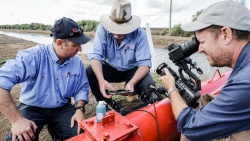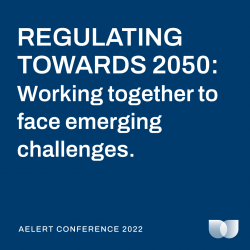
Search archive
NRAR's Chief Regulatory Officer to chat with AELERT at upcoming webinar
28/06/2022

AELERT National Council member and Chief Regulatory Officer for the NSW Natural Resources Access Regulator (NRAR), Grant Barnes will discuss NRAR's journey at an upcoming Members-only webinar on 2 August.
NRAR was created to change the water compliance landscape in NSW.
Established under the Natural Resources Access Regulator Act 2017 (NRAR Act), their mandate is to deliver effective, transparent and accountable enforcement of the laws.
NRAR also works to maintain public confidence in the enforcement of those laws.
"Through our work, there's acknowledgement amongst most water users that they can't take that extra drop, that every drop does count, particularly so in circumstance of drought."
Grant Barnes, quoted for ABC Landline in a recent story.
Log in to the Members Area to register.
*Due to a global outage on Microsoft Teams, this webinar was postponed to August 2.
The new registration link is available for Members on the event page.
2022 AELERT Conference: theme announced and call for papers
07/06/2022

The call for papers is now open for AELERT’s 2022 conference, themed ‘Regulating Towards 2050: Working together to face emerging challenges’.
Held at Novotel Sydney Parramatta from Tuesday, 29th November to Thursday, 1st December 2022; the Conference will also be streamed online for virtual attendance.
Papers can be submitted via the portal by 29 July 2022.
This year's Conference will focus on the fact that we are living in a changing world, and we are regulating in an environment that is subject to change.
Climate change is creating increased expectations to regulate greenhouse gas emissions, respond to climate induced environmental impacts such as increased frequency of natural disasters, and regulate adaptively during periods of sustained drought and flood.
We are also seeing the emergence of new industries and technologies which require regulation, while continuing to address addressing legacy impacts from past practices.
Call for Concurrent Papers
The Conference Committee is seeking Expressions of Interest for the conduct of concurrent presentations from stakeholders. Interested authors are encouraged to submit a paper of their selected topic for review and possible selection at the Conference.
Presenters will be required to indicate in which stream they wish their contribution to be considered in, including, but not limited to the concepts listed below:
Regulating emerging industries and responding to emerging environmental issues (Regulatory Practice Stream)
This stream focuses on current regulatory and emerging environmental threats in various jurisdictions, including challenges to achieving compliance.
Topics could include:
- Addressing unregulated pollutants and other environmental issues
- Regulating new and emerging issues, industries, and technologies
- Adaptive regulation in response to changing circumstances
Risk-based regulation: what’s new in the regulatory toolkit? (Legislation and Policy Stream)
This stream focuses on recent developments in risk based environmental regulation.
Topics could include:
- New legislation to address environmental issues
- New regulatory tools to address environmental harm, hold offenders to account and improve investigative and enforcement powers
- New policy approaches.
Innovation and technology: Adapting the way we work to meet emerging challenges (Innovation and Adaptation stream)
This stream focuses on showcasing new and emerging solutions driving more effective environmental practice, and the use of new ideas and ways of thinking including intelligence, technology, and data analytics to address environmental problems.
Topics could include:
- Using data from self-monitoring, citizen science and complaints to solve problems and target enforcement activities
- Exploring the value of using intelligence to improve environmental outcomes
- The use of tech-enabled innovation such as sensor technologies, body worn cameras or drones
- Using data and predictive analytics and new technology for effective targeting and identifying non-compliance
- Embedding intelligence in environmental agencies
- Research opportunities for academia
- Learning from the results on inquiries into regulation
- Installing a culture of compliance
- Best practice and new approaches in regulatory frameworks, environmental law/policy and fieldcraft
- Measuring outcomes and impacts
- Meeting compliance challenges in the Local Government sector
- Tools for consistent enforcement
- Utilising communications strategies to drive environmental outcomes
Other
We welcome submissions from relevant subject areas that may fit into the overarching conference theme, and we’re open to developing and refining the themes based on the range of submissions received.
Types of Presentations
Presenters will also be required to indicate the style of presentation they wish to deliver from the list below:
- Practitioner & Research Papers (10-15 mins including Q&A)
- Case Studies or Showcases (20-30 mins including Q&A)
- Plenary or Breakout Presentations (30-45 mins including Q&A)
- Plenary or Breakout Panel Discussions (45 mins including Q&A)
- Plenary or Breakout Workshops (45-60 mins including Q&A)
- Capacity Building Sessions (45-60 mins including Q&A)
- Discussion Roundtables (45-60 mins including Q&A)
Please download the Submission Guidelines which will provide you with all the information you require to prepare your submission.
Call for papers - submissions extended:
Paper submissions must be made through the online portal by 29th July 2022.

